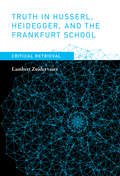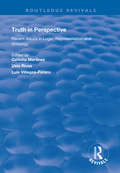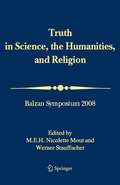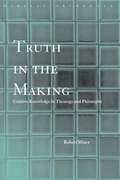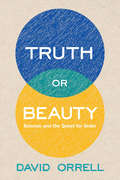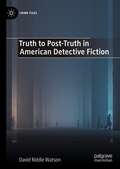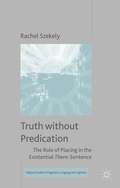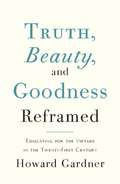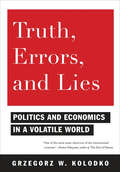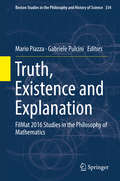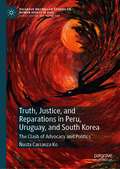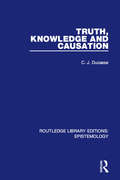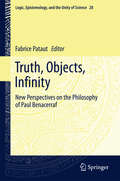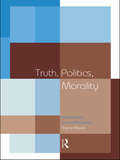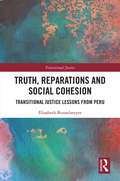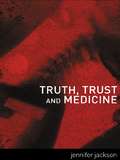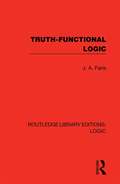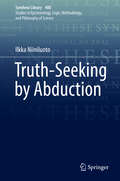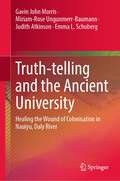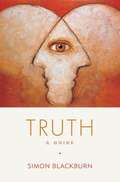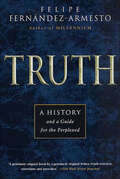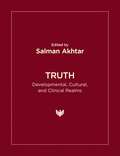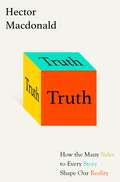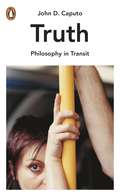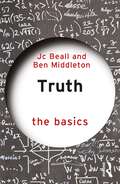- Table View
- List View
Truth in Husserl, Heidegger, and the Frankfurt School: Critical Retrieval (The\mit Press Ser.)
by Lambert ZuidervaartAn innovative, ambitious, tradition-crossing study drawing on the work of Husserl, Heidegger, Horkheimer, Adorno, and Habermas to propose a new and transformative concept of truth.The idea of truth is a guiding theme for German continental philosophers from Husserl through Habermas. In this book, Lambert Zuidervaart examines debates surrounding the idea of truth in twentieth-century German continental philosophy. He argues that the Heideggerian and critical theory traditions have much in common—despite the miscommunication, opposition, and even outright hostility that have prevailed between them—including significant roots in the phenomenology of Edmund Husserl. Zuidervaart sees the tensions between Heideggerian thought and critical theory as potentially generative sources for a new approach to the idea of truth. He argues further that the “critical retrieval” of insights from German continental philosophy can shed light on current debates in analytic truth theory.Zuidervaart structures his account around three issues: the distinction between propositional truth and truth that is more than propositional (which he calls existential truth); the relationship between propositional truth and the discursive justification of propositional truth claims, framed in analytic philosophy by debates between epistemic and nonepistemic conceptions of truth; and the relationship between propositional truth and the objectivity of knowledge, often presented in analytic philosophy as a conflict between realists and antirealists over the relation between “truth bearers” and “truth makers.” In an innovative and ambitious argument, drawing on the work of Husserl, Heidegger, Horkheimer, Adorno, and Habermas, Zuidervaart proposes a new and transformative conception of truth.
Truth in Perspective: Recent Issues in Logic, Representation and Ontology (Routledge Revivals)
by Concha Martínez Uxía Rivas Luis Villegas-ForeroFirst published in 1998, this volume has its origin in a meeting that was held in Santiago de Compostela University, Santiago de Compostela (Spain) in January 1996. The meeting was organized by the Department of Logic and Philosophy of Science in cooperation with the Association for Logic, Methodology and Philosophy of Science in Spain. Within analytical philosophy issues such as the definability of truth, its semantic relevance, its role in the distinction between formal and natural languages, the status of truth-bearers or in its case of truth-makers, have become a crossroads in the studies of logic, philosophy of science, philosophy of language, philosophy of mind, epistemology and ontology. Thus, in spite of what the title Truth in Perspective may suggest to the reader at first, the present volume is not only - though it is also a presentation of different theories or conceptions of truth. Most of the book presents a vision of different groups of philosophical questions in which the issue of truth appears embedded together with other related themes, from different points of view.
Truth in Science, the Humanities and Religion
by International Balzan FoundationThe question of the meaning of "truth" is central to many areas of contemporary debate, whether between those subscribing to a post-Enlightenment view of the world and those who seek fundamental truth in religious texts, or between those maintaining that there are absolute truths and those believing facts to be social constructs. For some, the ultimate truth is revealed through religious faith and textual authority. Can this view be reconciled with an evidence-based, materialist, post-Enlightenment perspective of the truth as embraced by the natural sciences? If religion holds the key to the truth, which religion and which truths? What is the attitude of the humanities to the meaning of truth? Truth in the sciences and the humanities as well as in religion and theology is the central theme of this book based on the proceedings of a conference organized by the International Balzan Foundation. It contains the speakers' lectures, the corresponding reactions of the invited panel members as well as the general discussions. The reader can familiarize himself with views ranging from philosophy to religion, from mathematics, physics and cosmology to biological sciences, history, sociology and economics. The exceptional wide scope of the book, comprising arguments about truth in the sciences, the humanities as well as religion and theology together with the discussions between representatives of all these different fields, means that it is of interest to a professional as well as a general readership.
Truth in the Making: Creative Knowledge in Theology and Philosophy (Routledge Radical Orthodoxy)
by Robert C. MinerIs knowing a purely passive reception of something concrete outside the mind, or when we know something, are we creating something too?Spanning more than 500 years of philosophical enquiry from the Middle Ages to the present day, Robert Miner clarifies modern philosophical conceptions of knowing as making or constructing, and contrasts this view with the theological understanding of knowing as a participation in divine creation.This study demonstrates how 'creative knowledge' has its roots in the theologies of Thomas Aquinas and Nicholas Cusanus. It explores the multiple ways in which this idea influenced the architects of modern philosophy, most notably Francis Bacon, René Descartes and Thomas Hobbes, despite their secular stance. Miner contends that, well in advance of Kant, one of these thinkers, Gaimbattista Vico provided a remarkably succinct formulation of the metaphysical and epistemological core of modernity in his principle verum et factum convertuntur: 'the true and the made are convertible'.In Truth in the Making, Robert Miner challenges the standard assumption that Kant was the first thinker to conceive of knowing as constructive activity, and shows how contemporary theology can reclaim a concept of knowing that is both creative and participant in divine wisdom.
Truth or Beauty
by David OrrellFor millennia, scientists and philosophers have strived to show that the universe is governed by a few simple principles. These principles are not derived from science. They do not come from looking through telescopes or carefully examining the results generated by particle colliders. Rather,they are based on aesthetic laws and concepts such as symmetry, beauty, and unity. Scientist and author David Orrell considers how aesthetics have influenced the models we create in hopes of explaining our universe. His book begins with a look at early scientific thinkers, from the ancient Greeks to Galileo. The ancients constructed a concept of the world based on musical harmony;later thinkers overturned this concept, but replaced it with a program, based on Newton's "rational mechanics," to reduce the universe to a few simple equations. Orrell then turns to the scientific program of the twentieth century, culminating in supersymmetric string theory, which was againinfluenced by deep aesthetic principles. In a final section of the book, Orrell broadens his discussion to other fields of research, including economics, architecture, and health. Recent history has shown us what happens when financiers rely on a model of economics that resembles what a good theory"should look like" rather than the messy reality of human interaction. Ideas of mathematical elegance have inspired, entranced, and "sometimes misled" thinkers in their desire to find the laws that govern our universe. Orrell evaluates these aesthetic principles as a means of understanding the structure of the universe - let alone messy human society - and questionswhether they reflect an accurate way to understand our world. Truth or Beauty comes at an interesting period, when the multi-billion-dollar Large Hadron Collider in Switzerland has been designed to test the existence of exotic phenomena such as supersymmetric particles. Will these too turn out to be nothing more than a beautiful illusion?
Truth to Post-Truth in American Detective Fiction (Crime Files)
by David Riddle WatsonTruth to Post-Truth in American Detective Fiction examines questions of truth and relativism, turning to detectives, both real and imagined, from Poe’s C. Auguste Dupin to Robert Mueller, to establish an oblique history of the path from a world where not believing in truth was unthinkable to the present, where it is common to believe that objective truth is a remnant of a simpler, more naïve time. Examining detective stories both literary and popular including hard-boiled, postmodern, and twenty-first century novels, the book establishes that examining detective fiction allows for a unique view of this progression to post-truth since the detective’s ultimate job is to take the reader from doubt to belief. David Riddle Watson shows that objectivity is intersubjectivity, arguing that the belief in multiple worlds is ultimately what sustains the illusion of relativism.
Truth without Predication: The Role of Placing in the Existential There-Sentence
by Rachel SzekelyThis book contains an original analysis of the existential there-sentence from a philosophical-linguistic perspective. At its core is the claim that there-sentences' form is distinct from that of ordinary subject-predicate sentences, and that this fundamental difference explains the construction's unusual grammatical and discourse properties.
Truth, Beauty, and Goodness Reframed
by Howard GardnerGardner (cognition and education, Harvard Graduate School of Education) is well-known for his work on multiple intelligences. Here, he traces changes in the Western classical virtues conceptions of truth, beauty, and goodness over the past 60 years, and describes new challenges in making sense of these virtues in an era of postmodernism and digital media. He gives suggestions for parents, teachers, and others who wish to educate for these virtues throughout the lifespan, both in and out of the classroom. According to the author, the book may be read "as a sustained argument against the hegemonies of biological determinism and economic determinism. " Annotation ©2011 Book News, Inc. , Portland, OR (booknews. com)
Truth, Errors, and Lies: Politics and Economics in a Volatile World
by Grzegorz KolodkoGrzegorz W. Kolodko, one of the world's leading authorities on economics and development policy and a key architect of Poland's successful economic reforms, applies his far-reaching knowledge to the past and future of the world economy, introducing a framework for understanding our global situation that transcends any single discipline or paradigm.Deploying a novel mix of scientific evaluation and personal observation, Kolodko begins with a brief discussion of misinformation and its perpetuation in economics and politics. He criticizes the simplification of complex economic and social issues and investigates the link between developments in the global economy and cultural change, scientific discoveries, and political fluctuations. Underscoring the necessity of conceptual and theoretical innovation in understanding our global economic situation, Kolodko offers a provocative study of globalization and the possibility of coming out ahead in an era of worldwide interdependence. Deeply critical of neoliberalism, which sought to transfer economic control exclusively to the private sector, Kolodko explores the virtues of social-economic development and the new rules of the economic game. He concludes with a look at our near and distant future, questioning whether we have a say in its making.
Truth, Existence and Explanation: FilMat 2016 Studies in the Philosophy of Mathematics (Boston Studies in the Philosophy and History of Science #334)
by Mario Piazza Gabriele PulciniThis book contains more than 15 essays that explore issues in truth, existence, and explanation. It features cutting-edge research in the philosophy of mathematics and logic.Renowned philosophers, mathematicians, and younger scholars provide an insightful contribution to the lively debate in this interdisciplinary field of inquiry. The essays look at realism vs. anti-realism as well as inflationary vs. deflationary theories of truth. The contributors also consider mathematical fictionalism, structuralism, the nature and role of axioms, constructive existence, and generality. In addition, coverage also looks at the explanatory role of mathematics and the philosophical relevance of mathematical explanation.The book will appeal to a broad mathematical and philosophical audience. It contains work from FilMat, the Italian Network for the Philosophy of Mathematics. These papers collected here were also presented at their second international conference, held at the University of Chieti-Pescara, May 2016.
Truth, Justice, and Reparations in Peru, Uruguay, and South Korea: The Clash of Advocacy and Politics (Palgrave Macmillan Studies on Human Rights in Asia)
by Ñusta Carranza KoThis book presents the first cross-regional analysis of post-transitional justice periods and the conditions that influence states’ behaviors. Specifically, the book examines why states that adopt and ostensibly implement transitional justice norms as policies—criminal prosecutions, reparations policies, and truth commissions—fail to follow through with their recommendations. Applying these perspectives to a comparative study of states from Latin America and East Asia—namely, Peru, Uruguay, and South Korea—which accepted and implemented transitional justice norms but took different trajectories of behavior after the implementation of policies, this book contributes to understanding the relationship of norm influence on states and why states change in compliance after norm adoption. The book explores the conditions that contribute or limit the continued respect for transitional justice norms, emphasizing the political interests and transnational advocacy networks’ roles in affecting states’ policies of addressing past abuses.
Truth, Knowledge and Causation (Routledge Library Editions: Epistemology)
by C. J. DucasseOriginally published in 1969. This book examines the fundamental concepts of metaphysics and of theory of knowledge. Topics treated include the nature of substance and of causation; their relation to natural laws, dispositions, and attributes; the nature of consciousness and purposiveness; of symbols, signs, and signals, and their relation to interpretation and objective reference; and the nature and criteria of truth. The author holds that philosophy is by intent a science and that its becoming so requires precise and non-arbitrary semantical analysis of basic philosophical terms. He argues that philosophy then, like the other sciences, has practical importance: in its case this consists in its capacity to give to difficult practical decisions not only the efficacy insured by its application of the findings of the other sciences, but in addition some of the wisdom which is philosophy’s distinctive ultimate aim.
Truth, Objects, Infinity
by Fabrice PatautThis volume features essays about and by Paul Benacerraf, whose ideas have circulated in the philosophical community since the early nineteen sixties, shaping key areas in the philosophy of mathematics, the philosophy of language, the philosophy of logic, and epistemology. The book started as a worskhop held in Paris at the Coll#65533;ge de France in May 2012 with the participation of Paul Benacerraf. The introduction addresses the methodological point of the legitimate use of so-called "Princess Margaret Premises" in drawing philosophical conclusions from G#65533;del's first incompleteness theorem. The book is then divided into three sections. The first is devoted to an assessment of the improved version of the original dilemma of "Mathematical Truth" due to Hartry Field: the challenge to the platonist is now to explain the reliability of our mathematical beliefs given the very subject matter of mathematics, either pure or applied. The second addresses the issue of the ontological status of numbers: Frege's logicism, fictionalism, structuralism, and Bourbaki's theory of structures are called up for an appraisal of Benacerraf's negative conclusions of "What Numbers Could Not Be. " The third is devoted to supertasks and bears witness to the unique standing of Benacerraf's first publication: "Tasks, Super-Tasks, and Modern Eleatics" in debates on Zeno's paradox and associated paradoxes, infinitary mathematics, and constructivism and finitism in the philosophy of mathematics. Two yet unpublished essays by Benacerraf have been included in the volume: an early version of "Mathematical Truth" from 1968 and an essay on "What Numbers Could Not Be" from the mid 1970's. A complete chronological bibliography of Benacerraf's work to 2016 is provided. Essays by Jody Azzouni, Paul Benacerraf, Justin Clarke-Doane, S#65533;bastien Gandon, Brice Halimi, Jon P#65533;rez Laraudogoitia, Mary Leng, Antonio Le#65533;n-S#65533;nchez and Ana Le#65533;n-Mej#65533;a, Marco Panza, Fabrice Pataut, Philippe de Rouilhan, Andrea Sereni, and Stewart Shapiro.
Truth, Politics, Morality: Pragmatism and Deliberation
by Cheryl MisakCheryl Misak argues that truth ought to be reinstated to a central position in moral and political philosophy. She argues that the correct account of truth is one found in a certain kind of pragmatism: a true belief is one upon which inquiry could not improve, a belief which would not be defeated by experience and argument. This account is not only an improvement on the views of central figures such as Rawls and Habermas, but it can also make sense of the idea that, despite conflict, pluralism, and the expression of difference, our moral and political beliefs aim at truth and can be subject to criticism.Anyone interested in a fresh discussion of political theory and philosophy will find this a fascinating read.
Truth, Reparations and Social Cohesion: Transitional Justice Lessons from Peru
by Elisabeth BunselmeyerThis book addresses the effectiveness of transitional justice mechanisms for repairing social cohesion. Truth commissions and reparation programs are implemented worldwide to enhance social cohesion, peace and democracy in post-conflict settings. Most claims about transitional justice measures are, however, normatively and not empirically based.The book questions whether attention from a truth and reconciliation commission can truly change the lives of the violence-affected people and whether monetary compensations or communal projects in form of milk cows can ever truly "repair" the harm suffered. The within-country comparative case study analyzes the effects of the commission and reparation program in Peru. It studies the post-conflict situation and the development of social cohesion in communities affected by the internal armed conflict. Using detailed empirical data this analysis reveals why the "reparation" of social cohesion in Peru was an impossible task. Contributing to a broader understanding of the impact of nationally applied transitional justice instruments in local settings, the book further offers a new framework for analyzing social cohesion as one of the aims of transitional justice processes. Offering a detailed account of transitional justice processes and social cohesion on the micro level, as well as an important analysis of their relationship, this innovative monograph will be invaluable for transitional justice scholars and students, as well as for international political and societal actors who are involved in transitional justice measures.
Truth, Trust and Medicine
by Jennifer JacksonTruth, Trust and Medicine investigates trust and honesty in medicine. It looks at the doctor-patient relationship, raising questions which disturb notions of patients' autonomy and self-determination, such as withholding information and consent and covert surveillance in care units. It will be of interest to those working in medical ethics and applied philosophy, and a valuable resource for practitioners of medicine.
Truth-Functional Logic (Routledge Library Editions: Logic)
by J. A. FarisOriginally published in 1962. This book gives an account of the concepts and methods of a basic part of logic. In chapter I elementary ideas, including those of truth-functional argument and truth-functional validity, are explained. Chapter II begins with a more comprehensive account of truth-functionality; the leading characteristics of the most important monadic and dyadic truth-functions are described, and the different notations in use are set forth. The main part of the book describes and explains three different methods of testing truth-functional aguments and agument forms for validity: the truthtable method, the deductive method and the method of normal forms; for the benefit mainly of readers who have not acquired in one way or another a general facility in the manipulation of symbols some of the procedures have been described in rather more detail than is common in texts of this kind. In the final chapter the author discusses and rejects the view, based largely on the so called paradoxes of material implication, that truth-functional logic is not applicable in any really important way to arguments of ordinary discourse.
Truth-Seeking by Abduction (Synthese Library #400)
by Ilkka NiiniluotoThis book examines the philosophical conception of abductive reasoning as developed by Charles S. Peirce, the founder of American pragmatism. It explores the historical and systematic connections of Peirce's original ideas and debates about their interpretations. Abduction is understood in a broad sense which covers the discovery and pursuit of hypotheses and inference to the best explanation. The analysis presents fresh insights into this notion of reasoning, which derives from effects to causes or from surprising observations to explanatory theories.The author outlines some logical and AI approaches to abduction as well as studies various kinds of inverse problems in astronomy, physics, medicine, biology, and human sciences to provide examples of retroductions and abductions. The discussion covers also everyday examples with the implication of this notion in detective stories, one of Peirce’s own favorite themes.The author uses Bayesian probabilities to argue that explanatory abduction is a method of confirmation. He uses his own account of truth approximation to reformulate abduction as inference which leads to the truthlikeness of its conclusion. This allows a powerful abductive defense of scientific realism. This up-to-date survey and defense of the Peircean view of abduction may very well help researchers, students, and philosophers better understand the logic of truth-seeking.
Truth-telling and the Ancient University: Healing the Wound of Colonisation in Nauiyu, Daly River
by Gavin John Morris Miriam-Rose Ungunmerr-Baumann Judith Atkinson Emma L. SchubergThis book shares a strength-based truth-telling model, which reveals the trauma associated with the experience of colonisation and the traditional healing practices specific to the Nauiyu Nambiyu community in Australia. It explores the significance of community placed on developing the 'Ancient University', an Aboriginal-based, stand-alone healing centre that incorporates traditional healing practices. This book outlines the truth-telling model, which was developed by the Nauiyu community to address a community need. This unique approach represents a deliberate shift from decolonial scholarship, which merely captures Indigenous voice speaking back to the colonisers. This book explores Indigenous critical pedagogies to investigate theoretical frameworks with implications for planning, learning and teaching which are culturally responsive in a variety of contexts. It is the first of its kind that utilises an Indigenous research methodology on the country and with the people to which it belongs.
Truth: A Guide
by Simon BlackburnThe author offers a tour de force exploration of what he calls "the most exciting and engaging issue in the whole of philosophy"―the age-old war over truth. The front lines of this war are well defined. On one side are those who believe in plain, unvarnished facts, rock-solid truths that can be found through reason and objectivity―that science leads to truth, for instance. Their opponents mock this idea. They see the dark forces of language, culture, power, gender, class, ideology and desire―all subverting our perceptions of the world, and clouding our judgement with false notions of absolute truth. Beginning with an early skirmish in the war―when Socrates confronted the sophists in ancient Athens―Blackburn offers a penetrating look at the longstanding battle these two groups have waged, examining the philosophical battles fought by Plato, Protagoras, William James, David Hume, Hans-Georg Gadamer, Jacques Derrida, Michel Foucault, Richard Rorty, and many others, with a particularly fascinating look at Nietzsche. Among the questions Blackburn considers are: is science mere opinion, can historians understand another historical period, and indeed can one culture ever truly understand another. He concludes that both sides have merit, and that neither has exclusive ownership of truth. What is important is that, whichever side we embrace, we should know where we stand and what is to be said for our opponents.
Truth: A History and a Guide for the Perplexed
by Felipe Fernández-ArmestoWritten by a renowned Oxford historian, this fascinating volume presents a global history of truth. Sharp and authoritative, Truth manages to touch every period of human experience; it leaps from truth-telling technologies of "primitive" societies to the private mental worlds of great philosophers; from spiritualism to science and from New York to New Guinea. In clear, lucid prose, this little book takes on an enormous subject and makes it understandable to anyone.
Truth: Developmental, Cultural, and Clinical Realms
by Salman AkhtarThis edited collection gathers together erudite and considered contributions from Salman Akhtar, Cobi Avshalom, Brett Clarke, Mali Mann, Gila Ofer, Thomas Ogden, Louis Rothschild, Batya Shoshani, Michael Shoshani, Naama Shoshani-Breda, Ann Smolen, Donald Spence, Richard Waugaman, Thomas Wolman, and Vamik D. Volkan. Fifteen distinguished authors bring together their vast experience as psychologists, psychiatrists, psychoanalysts, social workers, and psychotherapists to present a nuanced and in-depth investigation into the concept of truth. Divided into five parts, the book begins with a thoughtful discussion from Brett Clarke on what truth means and its role in psychoanalysis. It then moves into the realm of development, looking at truth from the viewpoint of children, adolescents, and adults. Stepping from development to culture, the works of Shakespeare, Heidegger and Freud are brought into the debate alongside the relationship of truth with individual and large-group psychology. Next come four chapters taking 'truth' into the clinical realm, grounding theory in practice. The book is brought to completion by an epilogue from Louis Rothschild answering the vital question: 'Truly, what does all this mean?' A must-read book for practising clinicians and academics in the mental health and humanities fields that investigates the wide range of theories on truth, how they have changed over the years, and their practical applications.
Truth: How the Many Sides to Every Story Shape Our Reality
by Hector MacDonaldFrom one of the world's leading experts in business storytelling, and for readers of Daniel Levitin, Nate Silver, and Charles Duhigg, Truth: A User's Guide is about the different types of competing truths we face every day in life: how to identify them, why they work, when they are used and misused, and what we can do to guard against them or--when appropriate--to make constructive use of them.We tend to see the world like Orwell's Winston Smith: "There was truth and there was untruth." Yet the world is far more complicated than that. In a time of "post-truth", when "fake news" is itself the subject of our headlines, it is not "untruths" that we need to worry about. Hector Macdonald reveals and examines one of our greatest collective blind spots: we are all routinely misled by the truth. This is because for any fact, scenario, story, and situation, there are what Hector terms "Competing Truths." Why do Competing Truths matter? They matter because we vote, shop, work, co-operate, and fight based on what we believe to be true, and what we believe depends in large part on what we read or hear from others. Many of the most sophisticated and influential forms of political, business, and media communication manipulate technically true statements to pull the wool over the public's eyes. Truth is not an absolute--it has its own spectrum. Truth: A User's Guide shows us how to cut through the nebulous issue of truth using a scaffold of timely examples. These examples range from the disingenuous use of statistics in Donald Trump's speeches to the 2013 fallacy that Western quinoa demand was disadvantaging native Andean farmers, to the structure, ethics, and success of Uber. Macdonald is as comfortable and insightful parsing the influence of Facebook as he is examining Colgate's misleading campaign as the toothpaste recommended by dentists. Truth: A User's Guide explores how we can guard against the noise of competing truths, in business, in our personal relationships, and within ourselves, but also how we can use them to our advantage. Written with authority and humour, this is an accessible and illuminating narrative that will find a wide audience among readers in search of understanding why the meaning of "truth" seems to have gone completely haywire.
Truth: Philosophy in Transit (Philosophy in Transit)
by John D. CaputoIn the first in a new series of easily digestible, commute-lengthbooks of original philosophy, renowned thinker John D. Caputo explores the many notions of 'truth', and what it really meansRiding to work in the morning has has become commonplace. We ride everywhere. Physicians and public health officials plead with us to get out and walk, to get some exercise. People used to live within walking distance to the fields in which they worked, or they worked in shops attached to their homes. Now we ride to work, and nearly everywhere else. Which may seem an innocent enough point, and certainly not one on which we require instruction from the philosophers. But, truth be told, it has in fact precipitated a crisis in our understanding of truth. Arguing that our transportation technologies are not merely transient phenomena but the vehicle for an important metaphor about postmodernism, or even constitutive of postmodernism, John D. Caputo explores the problems posited by the way in which science, ethics, politics, art and religion all claim to offer us (the) "truth", defending throughout a "postmodern", or "hermeneutic" theory of truth, and posits his own surprising theory of the many notions of truth.John D. Caputo is a specialist in contemporary hermeneutics and deconstruction with a special interest in religion in the postmodern condition. The Thomas J. Watson Professor of Religion Emeritus at Syracuse University and the David R. Cook Professor of Philosophy Emeritus at Villanova University, he has spearheaded an idea he calls weak theology.
Truth: The Basics (The Basics)
by Jc Beall Ben MiddletonTruth: The Basics is a concise and engaging introduction to philosophical theories about the nature of truth. The two authors – leading philosophers in this field – build the book around a single question: what, if anything, is common to all truths, which makes them true? The book explores five important answers (‘theories’) to the given question: correspondence, semantic, verifiability, transparency, and plurality. For each given theory, the following questions are addressed: • What is the theory’s answer to the central question?• What is the basic motivation behind that answer?• What is a precise argument for that answer?• What are the biggest objections to that answer?• What are a few good resources for understanding more about the theory? An additional chapter provides an extensive introduction to the notorious liar paradox. Truth: The Basics is an ideal starting point for anyone seeking a lively and accessible introduction to the rich and complex philosophical study of truth. Key Features:> Written in a clear and concise fashion.> Clearly explains five major theories of truth for an uninitiated readership of undergraduate students and general readers.> Prepares the reader to tackle more advanced work in truth studies.> Makes connections between truth and other areas of philosophy, including the philosophy of language, semantics, metaphysics, logic and epistemology.> Includes technical appendices for more advanced readers.
